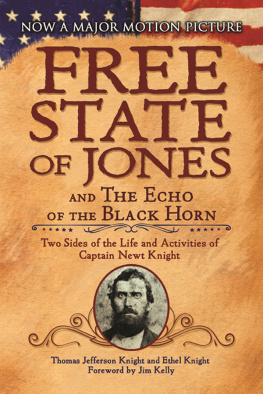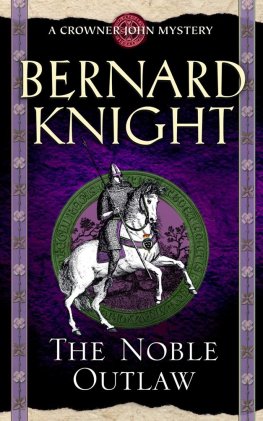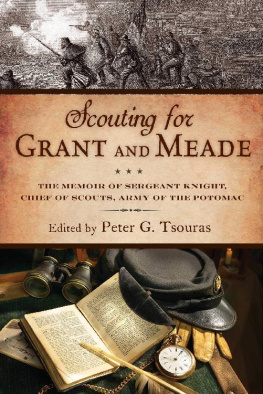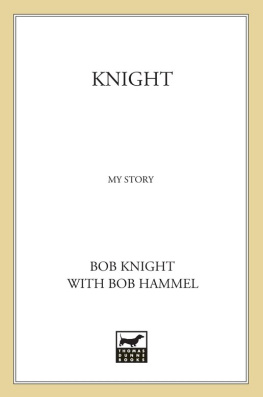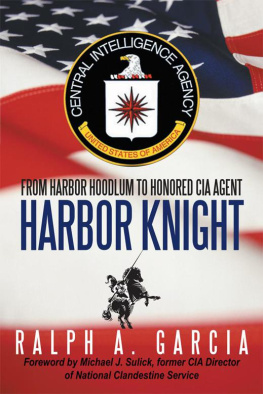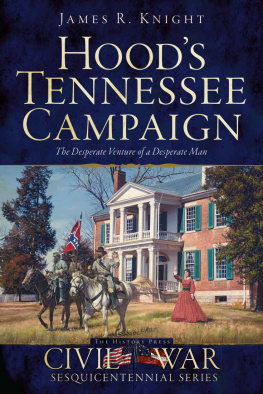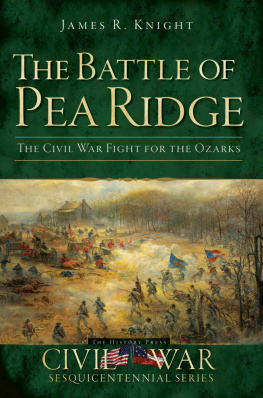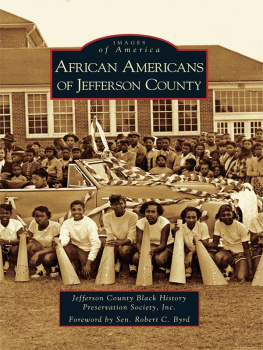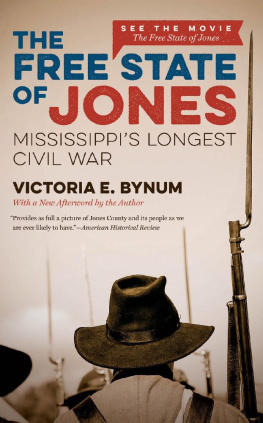The Life and Activites of Captain Newton Knight originally published in 1935
The Echo of the Black Horn originally published in 1951 by Parthenon Press
First Racehorse Publishing edition 2016
All rights reserved. No part of this book may be reproduced in any manner without the express written consent of the publisher, except in the case of brief excerpts in critical reviews or articles. All inquiries should be addressed to Racehorse Publishing, 307 West 36th Street, 11th Floor, New York, NY 10018.
Racehorse Publishing books may be purchased in bulk at special discounts for sales promotion, corporate gifts, fund-raising, or educational purposes. Special editions can also be created to specifications. For details, contact the Special Sales Department, Skyhorse Publishing, 307 West 36th Street, 11th Floor, New York, NY 10018 or .
Racehorse Publishing is a pending trademark of Skyhorse Publishing, Inc., a Delaware corporation.
Visit our website at www.skyhorsepublishing.com.
10 9 8 7 6 5 4 3 2 1
Library of Congress Cataloging-in-Publication Data is available on file.
Cover artwork: Shutterstock
Print ISBN: 978-1-944686-95-6
Ebook ISBN: 978-1-944686-96-3
Printed in the United States of America
Table of Contents
Foreword
The remarkable story of Newton Knight is an American classic. After studying Newton Knight off and on for the past ten years I see Newts experience resonates today more than ever. He was just 150 years ahead of his time. Newt is one of those rare individuals who took a stand for what he believed was right then lived his truth for the whole world to see. He was so comfortable in his skin that he seemed to live without fear. In one of his only interviews, at ninety-one, Newt observed, You know, Theres lots of ways Id ruther die than be scared to death.
Just as the war divided Jones County into warring factions, these two books offer competing accounts of who Newton Knight was. Thomas Jefferson Knight published the first biography of his father, The Life and of Activities of Captain Newton Knight and His Company and the Free State of Jones County in 1934. Tom was seventy-four years old and he gets a few dates mixed up and confuses names like Maury with Lowry. Tom was Newts son with his first wife Serena. Tom relates stories his father told him and testimonies from people in the community. He portrays Newt as the good shepherd who loved children.
Tom knew his father to be a devout man who never drank, cussed, or used tobacco. Newt was also an avenging angel known for protecting the poor women and children against the tyranny of Confederate abuse. Tom writes that his father saved some black children from their white master who was trying to keep them in bondage after the war was over. After the war, Tom talks about Newt going to Jackson a lot on business. We know this is true also because Newton Knight was on the winning side of the war at first, and he held several key governmental and military appointments that would have required him to travel by rail to Jackson.
On the first page of his text Tom inserted an odd story about a young Newt killing a black boy and how his mother changed the date of his birth to protect him from being charged with murder (which was almost impossible). I believe Tom invented this story to demonstrate that his father was on the right side of the race issue. Tom never once mentions that Newton entered into a common law marriage with his wartime ally, a former slave woman named Rachel with whom he fathered many children. Toms book also contains the rare Meigs Frosts interview with Newton.
The second book, The Echo of the Black Horn was published by Newtons grandniece Ethel Knight in 1951. Ethel was a very smart, independent woman, whose dark eyes seemed to look right through you. She dropped a bombshell when she introduced Rachel in her book. Although she used Rachels character to denigrate Newt, Ethels book was the only public acknowledgement of Newtons love for Rachel and their family together. Ethel alternately attacks Newt and Rachel with all of the racial venom she can muster because they had crossed one of the most taboo boundaries of white supremacy by mixing the blood of the races. Ethel seems to have a love-hate relationship with Newt, and she chronicles his skill as a military leader, his defense of the poor women and children during the war, and his alliance with blacks during the war and after.
When Mississippis slaveocracy led the state into war in 1861 they had made one of the most colossal mistakes in American history. Historian James Silver wrote, At least three generations of Southerners have paid a terrible price for the erratic behavior of their Confederate ancestors. One of the cherished tenets of the Lost Cause apologists was the idea that white Southerners were united in a noble war against overwhelming odds. The truth is the Confederacy was so divided against itself that it collapsed from within. Class antagonisms between small farmers and wealthy planters flared during the secession crisis, then exploded as the war dragged on. However, the yeoman farmers and cattle herders of Jones County had little use for a war over a states right to maintain the institution of slavery. Realizing it was a rich mans war and a poor mans fight, thousands of men deserted the Confederate service in 1863. In Jones County Newton Knight became the leader of a pro-American, anti-Confederate rebellion that was one of many hammer blows from within the heart of the Confederacy that helped bring about its collapse.
Confederate President Jefferson Davis knew of the Knight Company men. Davis was informed in March of 1864 that the deserters in Jones County were in open rebellion, defiant at the outset, proclaiming themselves Southern Yankees, and resolved to resist by force of arms all effort to capture them. One Confederate force, almost one thousand strong had just invaded Jones County with 200 cavalrymen, a battalion of sharpshooters, and a section of horse artillery. Another Confederate detachment of nearly one thousand men led by Colonel Robert Lowry quickly followed. Lowry hanged nine or ten of the Knight Company men, including one or two who were just boys. Both raids were unsuccessful, and the Knight Company remained. Since the Confederates could not defeat Newt in battle they changed the names of the county and town.
Tom and Ethels books also contain the 1865 petition to change the name of Jones County to Davis County in honor of Confederate President Jefferson Davis and the name of the county seat (Ellisville) to that of Leesburg, to honor Robert E. Lee. This way Jones Countys
past history and name may be obliterated and buried so deep that the hand of time may never resurrect it, but by chance posterity should learn that there was a Jones county and the black part of its history. We would ask (not egotistically) that this petition, together with the names of those annexed, may be recorded in the journals of both Houses, that their mind (posterity) may be disabused of any participation on our part of any of its dark deeds, and in duty bound will ever pray.
Approximately one hundred people signed this petition. However, in 1866, Jones County Unionists petitioned to have the names changed back to Jones County and Ellisville. Approximately 233 names are on this petition.
Mississippi is now the last state to fly the Confederate battle flag and the governor recently proclaimed April as Confederate Heritage Month. Confederate Heritage has long been a misguided refrain of those whose perceptions were misinformed by Lost Cause mythology. After the war, white Southern politicians and ex-Confederates, including Jefferson Davis, set about sanitizing the memory of the war by glossing over the fact that the Confederates had committed treason to protect slavery. Unfortunately this falsified history was adopted into many American history textbooks and became the accepted version of events in the popular mind.

